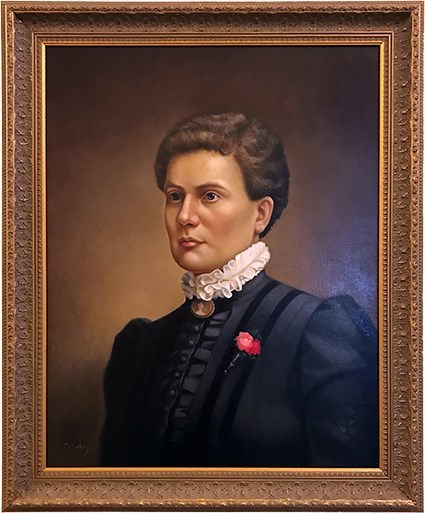This cache is to honor WOMEN in HISTORY. While meandmydogs started the series, others are welcome to add to the collection. The goal is to share the stories of women that led the way for good or bad.
The cache is NOT at the posted coordinates. You must solve the puzzle to find the final location

Marilla Marks (Young) Ricker (1840-1920) was a suffragist, philanthropist, lawyer, and freethinker. She was the first female lawyer from New Hampshire, and she paved the way for women to be accepted into the bar in New Hampshire. She was also the first woman to run for governor in that state, and the first woman to apply for a federal foreign ambassadorship post. She made significant and lasting contributions to the issues of women's rights and irreligion through her actions and her writings.
Marilla Marks Young was born in 1840 in New Durham, New Hampshire. Her mother, Sarah Young, was a devoted Free Will Baptist, and her father, Jonathon Young, was a freethinker. Jonathon taught her to think independently and to be curious, taking her to town meetings and courtrooms. She was educated at Colby Academy in New London, New Hampshire.
After Traveling to Germany, she returned to Washington, D.C. in 1876, she decided to study law. In a remarkably short time, she gained prominence as a competent and compassionate member of the profession. Ricker worked on the famous Star Route trial with Robert Ingersoll – perhaps the United States' most well-known agnostic. Ricker's legal career was also bound up with her freethought. In a losing cause, Ricker attempted to remove Washington's old Sunday law requiring shops to close in observance of the Sabbath.
During her career as a lawyer, Ricker became a strong advocate of prisoners' rights, and later received the nickname "the prisoner's friend". In 1879, she sought a hearing to protest the conditions in state prisons. The Boston Globe praised her charity, noting that she "spent her entire income, beyond the actual necessary expenses of her personal maintenance, in these noble efforts." She made especial efforts to represent accused individuals who could not afford legal help, very often charging no fees to her clients.
When Ricker applied, in 1910, to run for governor of New Hampshire, and when she applied, in 1897, for the position of ambassador to Colombia, she had no realistic hopes of being granted these posts. Rather, she was attempting to bring public attention to the fact that women were systematically excluded from positions for which they were equally qualified as men. "Whether I secure the appointment or not," she said of her ambassadorship application, "I have established a precedent in asking for it." She justified her application in explicitly egalitarian terms: "there is no gender in brain, and it is time to do away with the silly notion that there is."
In 1869, the year after her husband's death, Ricker attended the first National Woman Suffrage Association convention, organized by Elizabeth Cady Stanton and Susan B. Anthony. This marked a new period of active suffragist work in her life.
Explicitly asserting her belief in the equality of all peoples, Ricker acted upon these beliefs by attempting to vote in her hometown of Dover, New Hampshire, in 1870 – the first woman to do so. She continued to hand in her ballot for consecutive decades until the end of her life. Ultimately, she was willing to "tackle anything" for woman suffrage, "from a buzz saw to a bishop." Religion was, for Ricker, the ideological source of gender inequality in American society. "Let come what will come," she wrote, "no man, be he priest, minister or judge, shall sit upon the throne of my mind, and decide for me what is right, true, or good."
Ricker died just days after white women won the right to vote.
The cache is not at the posted coordinates. All the information you need to solve the puzzle are on this cache page
N43 26.ABC W71 09.D1E
Ricker applied, in 191A, to run for governor of New Hampshire
Ricker decided to study law in 187B
Ricker was born in 18C0
Ricker attempted to vote in her hometown of Dover, New Hampshire, in 1DE0 – the first woman to do so